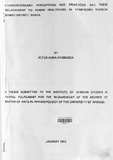| dc.contributor.author | Nyamanga, Peter A | |
| dc.date.accessioned | 2013-06-30T07:44:08Z | |
| dc.date.available | 2013-06-30T07:44:08Z | |
| dc.date.issued | 2005 | |
| dc.identifier.citation | Master of ARTS in Anthropology | en |
| dc.identifier.uri | http://erepository.uonbi.ac.ke:8080/xmlui/handle/123456789/42712 | |
| dc.description.abstract | This study was conducted among the Luo livestock farmers of Nyang'oma division of Bondo district, western
Kenya. The overall objective of this study was to identify and discuss lay people's perceptions and practices
about domestic animal healthcare and how these relate to those of human healthcare. The study subjects
therefore comprised all persons within the division who keep livestock. The unit of analysis was an individual
livestock farmer. However the study employed the purposive sampling technique with farmers who were
'perceived to possess more knowledge on animal healthcare being targeted for interviews. Individuals who
possessed expert indigenous knowledge on animal healthcare were also sampled for key informant
interviews.
Having been designed to obtain data on perceptions and practices regarding domestic animal health care
within a short period of time, the study adopted a cross-sectional design and only qualitative methods of data
collection were used. These included open-ended interviews, participant and direct observations, narratives,
FGDs, key informant interviews as well as ranking techniques.
The study findings showed that farmers in Nyang'oma rely more on the available local knowledge while
addressing animal health. It showed that it is the way j:l particular animal health problem is perceived that
directs individuals to a given remedial action. It was also established that there is a close relationship
between animal and human healthcare with certain concepts being shared. In terms of treatment certain
conditions in human beings are addressed in similar way and with similar practitioners as in animals.
Factors that determine choice of health care provision in animals were also found to be the same as those
directing choice in human healthcare. These included availability, cost considerations, belief in efficacy as
well as ideas about illness causation.
The findings show that a lot of perceptions and practices in animal healthcare have a lot of parallels with
those of human healthcare. This study therefore strongly recommends the incorporation of the
anthropological approaches in investigating not only human but animal health problems as well.
Anthropology recognises. the importance of emic perceptions in addressing human problems. Focusing on
emic perceptions in addressing animal health is very important for !he improvement of domestic animal
health and productivity. The study also recommends that the lo~al animal healthcare dispensers be
considered for training to improve competency in services they render. Documentation of ethnoveteri nary
medicine and practices should be done to safeguard against the loss not only of herbal plants but even of
traditional knowledge for the benefit of future generations. Such documentation may also be important in
environmental conservation. | en |
| dc.language.iso | en | en |
| dc.publisher | University of Nairobi | |
| dc.title | Ethnoveterinary Perceptions and Practices and Their Relationship to Human Healthcare in Nyan'goma Division Bondo District, Kenya | en |
| dc.type | Thesis | en |
| local.publisher | Institute Of Anthropology, Gender And African Studies, University of Nairobi | en |

